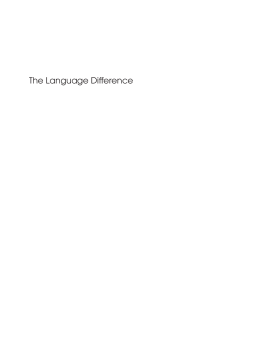
Additional Information
Book Details
Abstract
Language is a sensitive issue in the developing world, because language choice and behaviour are integral to the social, economic and political stability of multicultural societies. To what extent does this argument hold? Does language make a difference when it comes to development, and is there a perceptible difference in development between countries that is attributable to their choice of language? This book sets out to answer these questions by investigating how language has been and is being used in four countries of the Greater Mekong Sub-region (i.e. Cambodia, the Lao PDR, Myanmar and Viet Nam), especially in the critical areas of education, health, the economy and governance.
Paulin Djité poses a provocative but justified question: are students of language being 'precious' about links between language capability and material opportunity? In fine detail but with a strong linking narrative, Djité shows how personal advancement, economic success, national development and human resource planning are intimately and intricately structured according to the distribution of language and literacy skills. These connections are as reliable as are ties between human expressive abilities with personal and national identity. This is a fine and important volume due to this theoretical claim as much as for its welcome contribution to knowledge about language and development in the region and countries of the Greater Mekong area of SE Asia.
Joseph Lo Bianco, Professor of Language and Literacy Education, University of Melbourne and President, Australian Academy of the Humanities
Paulin Djité is Associate Professor of Sociolinguistics, Translation and Interpreting and French Linguistics in the School of Humanities and Languages at the University of Western Sydney. He also acts as an adviser for many international organisations in education, translation and interpreting, and international sporting events. His previous books include The Sociolinguistics of Development in Africa (2008), From Language Policy to Language Planning: An Overview of Key Languages in Australia (1994), and Voir l'Amérique et mourir (1992).
Beyond its value as a detailed account of language and development in polities that are little studied, the book reminds those of us for whom language is a passion that we must not become trapped in silo-like disciplinary mentalities. Rather, if we wish to understand how language planning works, we need to explore the connections in and our assumptions about languages in the wider sociolinguistic reality. Only then will we understand how and why languages matter.
Table of Contents
| Section Title | Page | Action | Price |
|---|---|---|---|
| Contents | v | ||
| Acknowledgements | vii | ||
| Preface | ix | ||
| Introduction | xv | ||
| Chapter 1\rLanguage and Development in\rthe Greater Mekong Sub-Region | 1 | ||
| Chapter 2\rLanguage and Education in the Greater Mekong Sub-Region | 21 | ||
| Chapter 3\rLanguage and Health in the Greater Mekong Sub-Region | 75 | ||
| Chapter 4\rLanguage and the Economy in the\rGreater Mekong Sub-Region | 103 | ||
| Chapter 5\rLanguage and Governance in the\rGreater Mekong Sub-Region | 156 | ||
| Chapter 6\rThe Language Difference | 199 | ||
| References | 216 |
